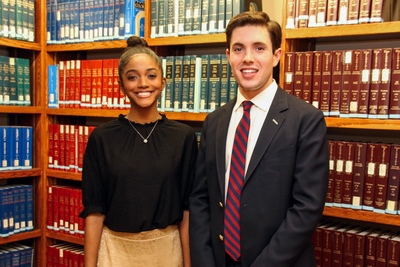ND Law Graduate Justice Fellows Lead Charge for Justice Research at the Center for Social Concerns

Notre Dame Law students Kaitlyn Bowe and Dennis Wieboldt completed a year-long fellowship with the University of Notre Dame Center for Social Concerns, an interdisciplinary institute responding to the complex demands of justice through a combination of justice education and research for the common good. As 2023-24 Graduate Justice Fellows, they joined an interdisciplinary community of graduate students from across the University to explore scholarship that engages questions of justice. The fellowship’s culminating event on April 29, “ReSearching for Justice,” showcased the fellows’ year-long research projects.
Established in 2022, the Graduate Justice Fellowship offers graduate students the opportunity to explore questions of justice broadly conceived from any disciplinary perspective. Fellows meet biweekly and work with invited scholars and leaders to sharpen research plans through interdisciplinary dialogue and workshops. The fellowship is also an opportunity for students to develop and workshop research and teaching plans with other early-career scholars to enhance quality, relevance, and impact. Bowe and Wieboldt were part of the second cohort of Graduate Justice Fellows that represented four colleges, two schools, and six departments around the University.
“One of the challenges inherent in traditional doctoral studies is that students often feel isolated in narrow disciplinary silos,” said Wieboldt, a rising second-year law student and Ph.D. candidate in history at the University of Notre Dame. “When researchers from different backgrounds are put into a room together to evaluate common questions, conversations are enlivened and participants develop interests that they didn’t know they had previously.” “Oftentimes,” he added, “these conversations can even reveal grounds for future scholarly collaborations.”
Bowe, a rising third-year law student, expressed that she gained a more diverse perspective on justice through hearing from different speakers and engaging in collaborative conversations about justice with the other fellows.
“The opportunity to learn from students and experts outside of the Law School enriched my understanding of the expansive reach of justice-focused research,” said Bowe. “It provided me with valuable insights into the context of the space that I’m working in.”
In her research, Bowe examines America’s mass incarceration crisis, seeking transformative justice at the dynamic intersection of law, community, and equity. With the existence of staggering statistics and systemic disparities, she endeavors to understand the complexities of America’s punitive approach to criminal justice and advocates for proportionality in sentencing. As the world's leader in incarceration rates, the persistence of crime in the United States has demonstrated that incarceration alone fails to address the root causes of crime. Bowe’s research explores the disparities and inequities present within the American criminal justice system.
Focusing on rehabilitation, Bowe researches how we can address the underlying causes of criminal behavior and break the cycle of recidivism. Central to these recommendations is the need for nationwide legal reforms, grounded in criminology, human behavior, and development.
“By embracing values of community, equity, and rehabilitation, legal policies can become avenues for healing and transformation, rather than perpetrators of harm and recidivism. My research explores a new course for the American criminal justice system,” said Bowe.
In addition to being a Graduate Justice Fellow, Bowe is involved in Notre Dame Law School's Exoneration Justice Clinic, where she has gained practical experience advocating for clients who were wrongfully convicted. Bowe also took the Race & Policing seminar taught by Professor Stephen Smith, which examined topics that intersected with her research.
Wieboldt is broadly interested in the relationship between law, politics, and religion in the 20th-century United States. In a 2023 article, for example, Wieboldt demonstrated how American Catholic legal scholars used their legal training to forge inter-religious political coalitions during the Civil Rights Movement.
Wieboldt’s research interests stem from his studies at Boston College, where he graduated with undergraduate and graduate degrees in history. While conducting his first independent archival research project, he became interested in exploring how religious ideas influence legal practice and political advocacy in formally non-religious contexts.
Along with being a Graduate Justice Fellow, Wieboldt is a Richard and Peggy Notebaert Premier Fellow at the Graduate School and Edward J. Murphy Fellow at the Law School.
Both Bowe and Wieboldt drew parallels between the aims of the Graduate Justice Fellowship and the mission of Notre Dame Law School to educate a “different kind of lawyer.”
“Being a ‘different kind of lawyer’ means being dedicated to advancing equity,” said Bowe. “It means being passionate about advocating for those in need.”
For Wieboldt, “Being a ‘different kind of lawyer’ means drawing on wider arrays of knowledge and experience to effectively advance the common good through the law.”
While the fellowship primarily attracts students in doctoral programs, many of the conversations facilitated by the fellowship can still be constructive for students studying law. “Law students and legal advocates alike are often tasked with explaining legal concepts to those without formal legal training,” Wieboldt remarked. “The Graduate Justice Fellowship offers a wonderful opportunity for law students to gain experience translating legal ideas into everyday parlance that is accessible to non-lawyers.”
“It’s inspiring to see how much is being done currently, especially at Notre Dame. It’s motivating to know that I’m at a place where this kind of justice-related research is encouraged,” added Bowe.
The application for the 2024-25 Graduate Justice Fellowship is now available here. Applications are due by May 24, 2024.